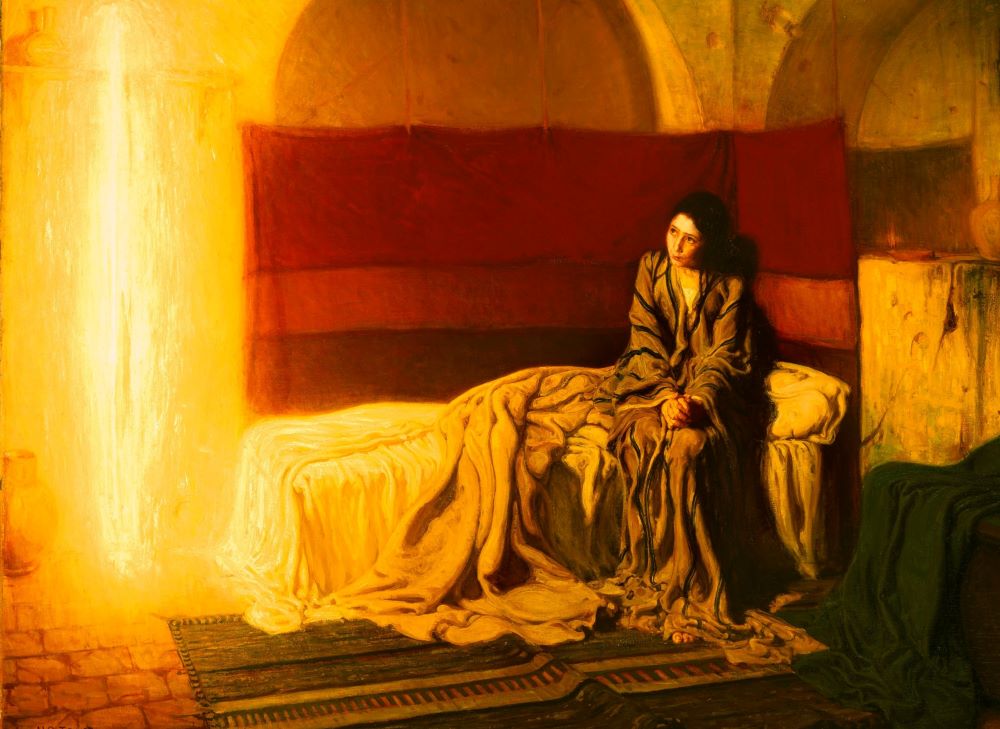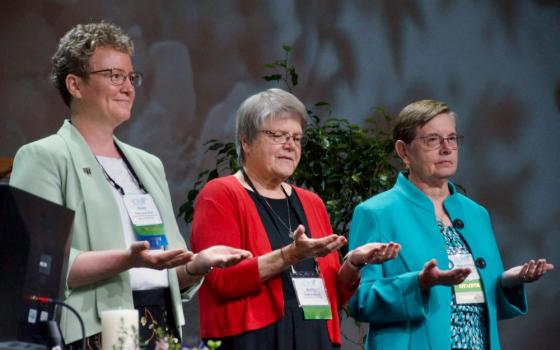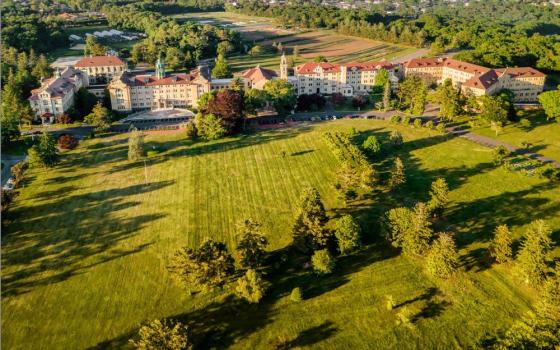
"The Annunciation" (1898) by Henry Ossawa Tanner (Philadelphia Museum of Art, www.philamuseum.org)
The Annunciation story has inspired many artists across the ages to depict the scene of Mary's interaction with the angel Gabriel. In the most famous ones, there are always two figures: the young, startled, Mary and a smiling, beatific angel. The setting is usually bright and beautiful.
My favorite rendition is quite different, and, to me, much more telling. The 1898 depiction by Henry Ossawa Tanner shows Mary sitting on the edge of her bed in near darkness, pondering the brilliant light enveloping the far side of her room. No angel; only light.
Luke, the evangelist, tells the story in Chapter 1 of his Gospel.
It's hard to imagine a young woman listening to an inner or audible message and having the courage to ask: "How can this be?" The answer introduced her to the power of the Holy Spirit. "The Holy Spirit will come upon you, and the power of the Most High will overshadow you."
What did Mary understand when she heard "and the child to be born of you will be called holy, the son of God"?
But God's grace was strong, and Mary responded, "May it be done to me according to your word." With that assent, the Word was made flesh, and joined our human community. Spirit and flesh are opposites. "Flesh" designates a human being. Jesus was born a human child, just like us in all things, except sin.
Jesus was, by God's power, a true, complete human being, but sinless. As soon as Mary gave her consent, her son and God's anointed began his human life. When he died on the cross, his human life ended. When he was raised from the dead, his glorified life as God/man began. He was still the man he had been, the one whom the apostles recognized, but now he was in divine union with the Father and the Holy Spirit in the Godhead.
In his book The Conspiracy of God, Jesuit Fr. John Haughey deftly explains that the Holy Spirit, who was involved in the conception of Jesus, dwelt within him (as He does in us) and guided him as he matured to understand that he was God's beloved son.
Haughey explores the gentle loving way in which his mother Mary led him into an understanding of who he was, the son of God. Jesus' mother and the Holy Spirit were his teachers. Haughey asserts that Mary's role in educating Jesus was as significant as her role in giving him life. "Mary is the instrument the Spirit used to bring about the union of God with man, and Jesus with his Father."
Advertisement
The single Gospel text about Jesus' early life shows that Jesus knew who he was by the time he was 12 years old. When Mary and Joseph, distressed, found Jesus in the temple, listening to the elders and asking them questions when he should have been in their caravan, he responded calmly, "Did you not know that I must be in my Father’s house?" (Luke 2:49). Mary pondered these words, and knew that she and the Holy Spirit had been successful.
Scripture is silent about Jesus' life until the event of his baptism. Despite John's protestations, Jesus knew that it was right for him, a human being like the others around him at the river, to be baptized. All four evangelists recount the baptism, although in different ways. But it is clear that God is "well pleased" with his son, Jesus.
Jesus began his public life with an announcement in the synagogue that illumines his deepening relationship with the Holy Spirit. "The Spirit of the Lord is upon me, for he has anointed me to bring glad tidings to the poor …" (Luke 4:18). He relied on the Spirit to give him the power that he needed for the confrontations that he would experience. For example, his exorcisms aroused anger in the evil spirits who had attained power in the territory of his Father.
Some events in the public life of Jesus seem to indicate that Jesus, even in his human life, was God. He walks on water, cures the sick, raises the dead, casts out devils. But Jesus is God's beloved, human son. How can this be?
Jesus had access to the power of God through the Holy Spirit, who dwelt within him. Haughey's book is subtitled "The Holy Spirit in Us." He describes the power of the Holy Spirit in Jesus' life, and thereby illumines the possibilities of the power of the Holy Spirit in every person's life.
From Jesus' conception, the Holy Spirit was guiding him. As he grew in age, he grew in wisdom and grace by welcoming, accepting and calling on the power of the Holy Spirit. He invoked this power to effect everything that was beyond his human power.
When Jesus reaches out for help from the Holy Spirit, he knows that the Holy Spirit will respond. He has been aware of this activity of the Holy Spirit throughout his life. We also have power to call on the Holy Spirit.
We may need to reflect on this Gospel message more deeply: "Truly I tell you, if you have faith as small as a mustard seed, you can say to this mountain, 'Move from here to there,' and it will move. Nothing will be impossible for you" (Matthew 17:20).
In these words, Scripture reminds us of the role of the Holy Spirit in our lives, if — if — we have faith.
As we contemplate the words and actions of the man Jesus in his public life, we realize that he is teaching us how to live our human lives. He could do this authentically because he was fully human. His mission was to help the Chosen People to understand how to live life under the new law of love: "Love one another as I have loved you" (John 13:34).
Ponder once again Tanner's Annunciation scene. Pause on the darkness surrounding Mary. Think of how little she knew. Could she even imagine the meaning of the message: "The power of the Most High will overshadow you"?
But subsequent Scripture reveals so much to us, the people of God. We see Jesus, God's human son, showing us how he lived a human life and called on the power of the Holy Spirit dwelling within him to move the mountain of mankind's disbelief by his miracles.
The feast of the Annunciation (April 8) reminds us each year that God sent his son to join humanity fully to be a model for us in every circumstance of our lives, and to introduce us, by example, to the power of the Holy Spirit in our lives. What more could we ask for to enable us to face with courage and determination the burning issues of our times? We, singly and collectively, have access to power that can move our own mountains. With new energy, let us rely on the Holy Spirit to direct us in our personal choices, and to enable us confidently to address the problems of our times.





